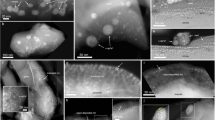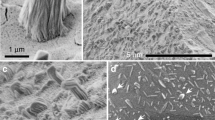Abstract
A LABORATORY investigation of the luminescence spectra of a number of materials, of types which might possibly exist on the lunar surface, is being carried out with the view of permitting comparison with the luminescence spectrum of the Moon itself. We excite the luminescence in vacuum by means of a beam of protons1, usually with an energy of about 40 keV, and record the spectrum of any luminescence emission by means of a photoelectric spectrophotometer2.
This is a preview of subscription content, access via your institution
Access options
Subscribe to this journal
Receive 51 print issues and online access
$199.00 per year
only $3.90 per issue
Buy this article
- Purchase on Springer Link
- Instant access to full article PDF
Prices may be subject to local taxes which are calculated during checkout
Similar content being viewed by others
References
Derham, C. J., and Geake, J. E., Tech. Note No. 2, Contract AF 61(052)–379.
Geake, J. E., and Lumb, M. D., Tech. Note No. 1, Contract AF 61(052)–379.
Prior, G. T., Catalogue of Meteorites (1953).
Author information
Authors and Affiliations
Rights and permissions
About this article
Cite this article
DERHAM, C., GEAKE, J. Luminescence of Meteorites. Nature 201, 62–63 (1964). https://doi.org/10.1038/201062a0
Issue Date:
DOI: https://doi.org/10.1038/201062a0
This article is cited by
-
Thermoluminescence of the lunar surface
The Moon and the Planets (1982)
-
An anomalous brightening of the lunar surface observed on March 26, 1970
The Moon (1971)
-
Luminescence Caused by Proton Impact with Special Reference to the Lunar Surface
Nature (1966)
-
Thermoluminescence of the Moon
Nature (1966)
-
Lunar Luminescence
Nature (1965)
Comments
By submitting a comment you agree to abide by our Terms and Community Guidelines. If you find something abusive or that does not comply with our terms or guidelines please flag it as inappropriate.



